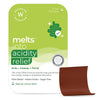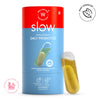Acid reflux, heartburn, and indigestion—unpleasant sensations that can turn even the best meal into a regrettable experience. If you’ve ever found yourself reaching for an antacid to ease the discomfort, you’re not alone. But while these quick fixes may bring immediate relief, the bigger question remains: are antacids a sustainable, long-term solution?
Let’s dive into how antacids work, their potential drawbacks, and, most importantly, natural solutions that support digestive health without the need for constant reliance on over-the-counter medication.
Understanding Antacids: How Do They Work?
Antacids are designed to neutralize excess stomach acid, providing fast-acting relief from symptoms like heartburn and acid reflux. Most conventional antacids contain compounds like calcium carbonate, magnesium hydroxide, or aluminum hydroxide, which react with stomach acid to reduce acidity levels.
While they can be effective in the short term, frequent use can lead to imbalances in stomach acid production, potentially causing digestive issues like bloating, nutrient malabsorption, and even dependence on these medications for relief.
The Hidden Downsides of Long-Term Antacid Use
While antacids seem like an easy fix, long-term use comes with its own set of concerns:
-
Nutrient Deficiencies – Stomach acid plays a crucial role in breaking down food and absorbing essential nutrients like calcium, magnesium, and vitamin B12. Chronic suppression of acid can lead to deficiencies over time, contributing to bone loss, fatigue, and neurological issues. [NIH]
-
Digestive Disruptions – Overuse of antacids can disrupt the delicate balance of gut bacteria, leading to bloating, gas, and even increased susceptibility to infections. [NIH]
-
Rebound Acid Production – When antacids are used frequently, the stomach may compensate by producing even more acid once the medication wears off, worsening symptoms in the long run. [NIH]
-
Potential Kidney and Heart Issues – Some antacids, particularly those containing aluminum or high levels of sodium, can contribute to kidney dysfunction and high blood pressure if used excessively. [NIH]
Given these concerns, it’s essential to look beyond temporary relief and focus on supporting digestive health naturally.
Natural Solutions for Lasting Relief
Instead of relying on antacids, shifting to a holistic approach can provide sustainable relief while improving overall gut health. Here’s how:
1. Nature’s Antacids: Ingredients That Soothe the Gut
Certain natural ingredients have been used for centuries to support digestion and prevent acid reflux. Incorporating these into your daily routine can make a world of difference:
-
Licorice Root – Helps soothe the stomach lining and supports the production of protective mucus.
-
Ginger – A natural digestive aid that helps reduce inflammation and prevent acid buildup.
-
Aloe Vera – Calms irritation and helps heal the digestive tract.
-
Apple Cider Vinegar – Contrary to popular belief, a small amount of ACV diluted in water before meals can actually aid digestion by balancing stomach acid levels.
-
Fennel and Caraway Seeds – Known for their ability to ease bloating and indigestion.
-
Chamomile and Peppermint – Support digestion while reducing inflammation in the gut.
2. Lifestyle Habits for Acid Reflux Prevention
Small changes in daily habits can have a profound impact on digestion and acid reflux prevention:
-
Mindful Eating – Eating slowly and chewing food thoroughly reduces the likelihood of overproduction of stomach acid.
-
Avoid Trigger Foods – Spicy foods, caffeine, alcohol, and processed foods can trigger acid reflux and should be consumed in moderation.
-
Stay Hydrated – Drinking plenty of water helps maintain a healthy digestive system.
-
Don’t Lie Down After Eating – Gravity plays a role in digestion. Staying upright for at least two hours after meals prevents acid from traveling back up the esophagus.
-
Elevate Your Head While Sleeping – If you experience acid reflux at night, sleeping with a slight incline can prevent discomfort.
-
Regular Exercise – Physical activity supports digestion, but avoid intense workouts immediately after meals.
-
Manage Stress – Chronic stress can trigger digestive issues, so incorporating meditation, deep breathing, and relaxation techniques can make a significant difference.
Choosing the Right Supplements for Digestive Health
If you’re looking for additional digestive support, opting for natural, scientifically formulated supplements can provide long-term relief without side effects. Look for supplements that contain a synergistic blend of probiotics, prebiotics, and herbal extracts designed to support gut balance and optimize digestion.
Key elements to look for in a high-quality digestive supplement include:
-
Probiotics and Prebiotics – Promote a healthy gut microbiome, which plays a crucial role in digestion and immunity.
-
Digestive Enzymes – Help break down food efficiently and prevent indigestion.
-
Herbal Blends – Ingredients like ginger, fennel peppermint, etc support digestion and prevent acid buildup naturally.
One such option is Welleing Nutrition’s Acidity Relief, a well-balanced formula that combines probiotics, prebiotics, and soothing herbal extracts to alleviate acidity, bloating, and discomfort while promoting long-term digestive wellness.
The Takeaway
Antacids may offer quick relief, but they are not a sustainable long-term solution. Over time, frequent use can lead to unwanted side effects and digestive imbalances. Instead, focusing on natural ingredients, mindful eating habits, and gut-friendly supplements can provide lasting relief while enhancing overall digestive health.
By making small but significant changes to your diet and lifestyle, you can support your body’s natural ability to maintain balanced acid levels—without relying on a quick fix. Your gut deserves better, and nature offers everything you need to keep it happy and thriving.































 DOWNLOAD NOW
DOWNLOAD NOW
